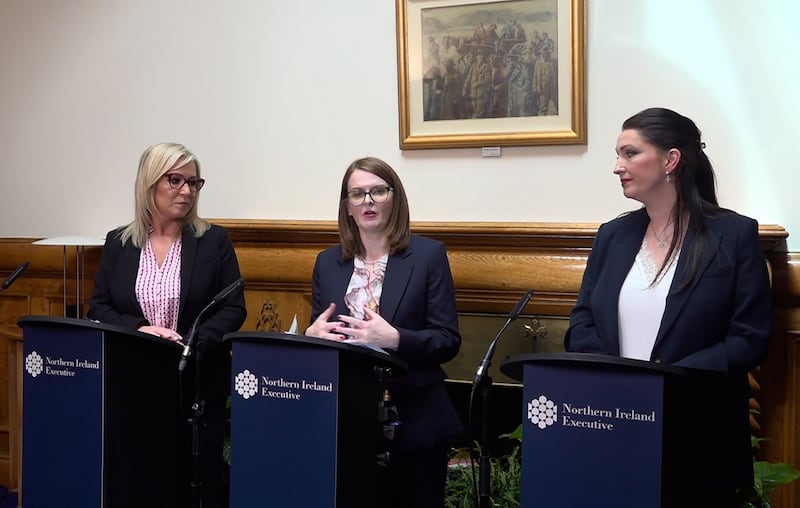Where is the smaller-government part of Northern Ireland politics? It should be a prominent feature of the party system.
The UUP is positioned, in theory at least, on the centre-right. As with so much of the UUP’s message, this has become more of an occasional tone than a coherent philosophy.
The DUP would like to be seen as a mainstream conservative party. For decades it boasted of careful stewardship of public money on councils and at Stormont, while cultivating a pro-business and anti-regulation image.
The renewable heat incentive scandal, Brexit and the decline in its vote seem to have knocked the confidence out of the DUP to maintain this posture. It has been trying to reinvent itself as a protector of the block grant, pressing London to reform the Barnett formula and increase Stormont’s budget.
Although every nationalist party is on the left, they aspire to the ultimate small-government project in Northern Ireland: abolition of Northern Ireland itself. Shrinking Stormont is not just compatible with that goal but is probably a prerequisite for it. The Republic’s low-tax economic model is held up as a path to nirvana by parties that insist the same policies in any other context are a road to hell.
One of the ironies of the peace process is that John Hume started out proposing Northern Ireland be governed by a committee of six people – three elected, three appointed by London, Dublin and Brussels – and then ended up agreeing to a system so elaborate that the office of the first ministers alone employed more people than the White House.
- Newton Emerson: Why does suggesting the better-off pay more make me sound like I have two heads?Opens in new window
- Why are Stormont’s parties scared of sorting out the water system? – Newton EmersonOpens in new window
- The all-island economy has boosted growth and living standards – but there’s so much more to comeOpens in new window
The purpose of this over-engineered government, plus the huge expansion in public spending that accompanied it, was to ensure inclusion and buy-in across the political spectrum. Nationalists were considered to require particular reassurance. Now they hold a plurality of votes, nationalists could decide they no longer need such a bizarre contrivance.
Smaller government should be an easy sell to the electorate, as it is clear this is Northern Ireland’s political centre of gravity. Any suggestion of higher taxes or reduced giveaways immediately reveals the typical voter to be small-c conservative, sceptical of government and frustrated by perceptions of wasteful spending.
Stormont is facing the first genuine budget squeeze in its modern history, with the Treasury trying to force it to decide between revenue-raising or cuts. As Sinn Féin and the DUP have both ruled out serious revenue-raising, the need arises to sell a smaller-government message.

A budget has been drafted by Sinn Féin finance minister Caoimhe Archibald that indicates some willingness to confront reality. A programme for government, hoped for shortly, will presumably recognise financial constraints. However, it remains unlikely any executive party will advocate smaller government as a positive goal, rather than a problem they are forced to endure.
Centre-right politics has suffered an ideological collapse around the world as simple free-market concepts appear overwhelmed by economic change and complexity. Parties on the right are accepting a new consensus that government is the answer to most problems, or they are drifting into populism and culture-war distractions, or they are adopting a confused mix of both.
Northern Ireland is hardly immune, while power-sharing imposes a further stultifying effect. Stormont is set to approve an industrial strategy, for example – an idea back in fashion with western governments after the 1970s appeared to prove that ministers cannot ‘pick winners’.

Every economic and social problem apparently requires a strategy and every strategy seems to involve more money and intervention.
Yet Stormont agreed and partially delivered a small-government programme less than a decade ago.
The 2015 Fresh Start Agreement was based around a policy of ‘rebalancing the economy’, by shrinking the public sector and using the savings to cut corporation tax. Within a year, Stormont departments had been merged and civil service headcount had been reduced by 10 per cent through a voluntary redundancy scheme.
The Republic’s low-tax economic model is held up as a path to nirvana by parties that insist the same policies in any other context are a road to hell
Unusually, Fresh Start was a deal between the DUP and Sinn Féin alone, assisted by London and Dublin. They then formed the only two-party executive in Northern Ireland’s history. It cannot have been coincidence that this simpler government made a more pointed, less bland vision of better government easier to see.
The 2016 executive would be largely recreated if the UUP joined the SDLP in opposition, as it is threatening to do over the budget.
But it should not take musical chairs at Stormont to rediscover one the most basic positions in politics.


